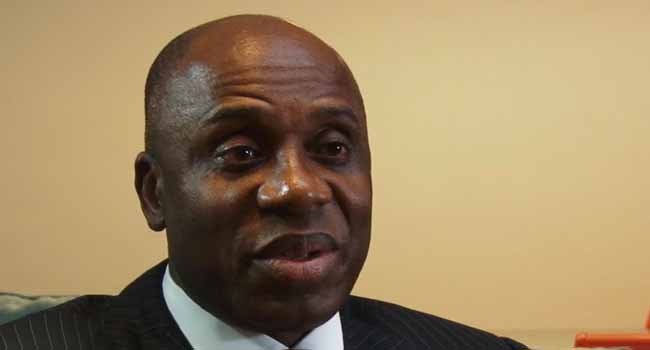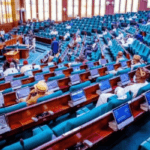A former Minister of Transportation, Rotimi Amaechi has revealed that the first ever Wagon Assembly Plant commissioned in Ogun State, Nigeria in 2023, the Kajola Locomotive and Wagon Rolling Stock Depot is currently abandoned. Speaking on Thursday as the Keynote Speaker during the Transport Summit organised by the Transportation Correspondents Association of Nigeria (TCAN), themed, ‘Internodal Transport: Prospects and Challenges ‘, the two times Governor of Rivers state revealed that the plant was built to ensure Nigeria produces wagons and other Rolling stocks needed for railway development projects. ...READ THE FULL STORY FROM SOURCE ↔️
According to Mr. Rotimi Amaechi, “There are so many things we had in the rail project that most other countries didn’t get.
“If you get to Prof. Yemi Osinbajo Train Station in Kajola, there is a Wagon Rolling Stock there. We commissioned that facility in 2023.
“The Kajola Locomotive and Wagon Rolling Stock was not part of the Lagos-Ibadan Rail project, but we insisted that the Chinese must build the facility to enable us gain knowledge transfer in the area of Wagon and Rolling Stock manufacturing.
“I told the Chinese that I am going to give them a contract to supply Nigeria 200 Rolling Stock. I however told them that I won’t approve the contract if they don’t build a Wagon Assembly Plant in Nigeria.
That after five years, they will start Assembling and manufacturing Wagons and Rolling Stocks in Nigeria. The agreement was signed.
“The reason for doing this was to create employment and reduce foreign exchange expenditure because we will produce here. Don’t forget, this was not part of the railway contract. I told the Chinese that instead of giving me money, they should go and build Transportation University, and they did.
“The Kajola Locomotive and Wagon Assembly Plant was also one of the demands I made from the Chinese, and it was also built.
“I was in South Africa, and saw that they are producing Locomotives. I asked them how they did it, and they said they awarded Locomotive contract to the Chinese and asked them to build a plant for them so they will know how they did it.
“So, because I wanted Nigeria to also benefit the same way South Africa benefitted, I demanded that the Chinese build a Wagon and Rolling Stock Depot in Nigeria.
“This was done and was commissioned in 2023, but as I speak today, that facility has been abandoned. Nothing is happening there. Until we continue to invest in transportation, we might never get it right in this country.”
In his own presentation, the Minister of Marine and Blue Economy Adegboyega Oyetola said that a critical component of unlocking the full potential of the country’s maritime sector is the integration of intermodal transportation.
Oyetola represented by Mr Yusuf Muhammad, Director of General Service, Ministry of Marine and Blue Economy, noted that efficiently linking the ports with road, rail, and inland waterways was key to optimising the movement of goods and enhancing trade.
According to Oyetola, “Our vision is to develop a seamless transport system where goods can flow smoothly between ships, trucks, and trains, boosting trade and economic growth.
“Intermodal transportation also aligns with our broader objective of reducing congestion, lowering carbon emissions, and enhancing the overall efficiency of our logistics chain,” he said.
The minister added that the ministry had embarked on several initiatives aimed at unlocking the vast potential of our marine resources.
“We have developed a comprehensive policy framework to enhance maritime safety, boost investment in port infrastructure, and promote sustainable fishing practices.
“The ministry has also established the National Strategy on Blue Economy which is aimed at regulating and promoting sustainable use of our marine resources,” he said.
He noted that the strategy was validated with the support and collaboration of InterAfrican Bureau. For Animal Resources (AU-IBAR) and the Kingdom of Norway.
Also speaking during the event, the Lagos State Commissioner for Transportation, Mr Oluwaseun Osiyemi said that with continued collaboration, Lagos State will become a model for integrated and innovative transport systems across Africa.
He disclosed that the collaboration sought are from the public and private sectors, as well as support from federal authorities and multilateral agencies.
The commissioner said that the state had established the Lagos State Transport Policy a document which serve as a roadmap toward a modern, multimodal, and sustainable transportation system that supports the economic growth and well-being of every Lagosian.
“We are committed to transforming public transportation in Lagos, making it a reliable, affordable, and environmentally sustainable option for all.
“Our transport policy places a strong emphasis on private sector participation. We recognise that no government can tackle the complex challenges of transport ation alone.
“By encouraging private investment, especially in public transport systems like the Bus Rapid Transit and rail and waterways infrastructure, we are creating a more resilient and sustainable transportation framework,” he said.
He pointed out that the vision in Lagos was to provide a modern transport system that was reliable with equitable access to all residents in an environmentally sustainable and economically cost-effective manner. He said that they recognise that transport was the backbone of any city’s development, adding that they aim to create a transport system that was integrated, safe, reliable, efficient, affordable, and environmentally friendly....For More READ THE FULL STORY ▶▶




